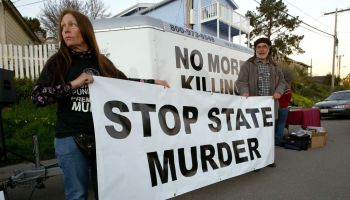Bryan Epps: ‘Why I Voted’
The United States has been shitting on folks of color long before 45 was elected as POTUS. The attempted, and actual, genocide of indigenous people, the enslavement of African-descended people, and the everyday pervasive subjugation and devaluation of citizenship for all people of color has created incalculable unearned privileges most white Americans, as well as other strict observers of white supremacy, benefit from. Historical trauma and present inequity consistently forces us, the not so silent majority, to contemplate our relationship to the State. But the debate should not center on whether we should participate or resist, but rather how we can and should do both.
A few months before last year’s Democratic Convention, I wrote a piece outlining the technical reasons Black progressive folks should vote. I was compelled to write the piece after talking to my peers who believe that being revolutionary means disavowing one’s conventionally understood civic duty. During the time the political environment was jacked-up, and it still is: The Democratic Party, a popular option for voters of color, was not communicating with us effectively. And come to find out, the Russians’ bots were all up and down our social media timelines with divisive and fake news. Most importantly, our own government, represented by extreme white supremacists and extreme capitalists, has been suppressing the vote in every state they can. This mix helped to curve many progressive folks of color, mostly Black men and millennials, away from the polls last November and even pushed some to vote for the Human Orange.
READ MORE: 6 Black Candidates Poised To Make History On Election Day 2017
Moreover, last year’s protest led by organizers from the Movement for Black Lives, coupled with the threat of nonsupport of Bernie Sanders supporters, prompted the Clinton campaign to construct a progressive political platform that few engaged. I am interested in what our political reality could look like if we continued to engage political candidates so as to move them towards progressive visioning, and after having elected them we continue to hold them accountable. I realize people are going to do what they want to do, but here are three more points on why participating civically by way of voting is just as critical, and as transformative, as disruptive action or the refusal to engage.
First, I believe the status quo does not determine the future. The future is unknown to us, which allows for the possibility of change. For example, when The Black Panther Party’s (BPP) Free Breakfast for Children program was introduced—a program that provided meals to school-age children during school hours—it highlighted both the failures and responsibilities of the federal government. Some argue that Black people, and among them Black voters, were responsible for holding the federal government accountable for implementing policy, namely the United State’s Department of Agriculture’s School Breakfast Program, as a good consequence of the BPP’s radical organizing efforts.
Second, if the majority of people in this country voted, even the majority of people of color, there could be deep political change. When we withdraw from voting it does not disempower white supremacists, it instead increases their rights and privileges. More clearly, an oppressive system relies on the dissuading of people and obstructing majoritarian votes to maintain an Oligarchy. Sean McElwee explains the process more succinctly in the Atlantic when he writes, ”Nonvoters tend to support increasing government services and spending, guaranteeing jobs, and reducing inequality—all policies that voters, on the whole, oppose”
Which leads me to my final point: Voter suppression is real. And it is a less noticeable, but no less violent form of bullying. It is the person who always wins, what could have been a fair fight, only because he never fights fair. It’s ugly and traumatic and its repercussions remain long after. Suppression of our vote has become so extreme that the importance, or value, of our individual vote has increased, especially for those of us living in swing states. As a result, voting among people of color is actually more important now than it was five or ten years ago.
I advocate for a demilitarized revolution. One that advances radical candidates who implement community based policy/legislation and programs that bring intersectional equity to our communities.
I firmly believe we need a revolution and that a demilitarized revolution is possible. Establishing progressive and revolutionary candidates, voting for those candidates, supporting them and holding them accountable is the clearest path towards that revolution. As a result, voting is and can be a serious means of resistance. With progressive politics and candidates we can divert public funds (namely, our money) away from destructive interventions like mass incarceration and food deserts into a more equitable society full of socially-responsible institutions. However, if the majority chooses to strap up as a form of transformation, know I ain’t shootin shit. You will find me somewhere in Africa shipping supplies to the resistance in the U.S. How many of us, if it came down to it, are really ‘bout that life and are ready for war and death and the implications such violence will have on our communities?
Brother Paul Daniels, and many non voters, believe there is a gap between our present reality and our imagined future. However the survival of people of color in this country has depended on our ability to innovate, create informal systems and love one another in the presence of death. To formerly advance the practices that have sustained us on the political stage we must vote. Because through the vote, we have the power to transform the nation and relationships we have developed globally. Political change is also possible through voting and the various tools connected to it.
I advocate for a demilitarized revolution. One that advances radical candidates who implement community based policy/legislation and programs that bring intersectional equity to our communities. This moment of suppression heightens the value of our individual vote particularly in states where voter suppression is operationalized by Republicans. Eligible voters of color should vote as a means of resistance and reform.
Bryan Epps is an innovative community builder and strategist.
Paul Daniels: ‘Why I Didn’t Vote’
Why didn’t I vote in the 2016 Presidential election? Well, the answer is less than satisfying – even to me. In fact, the answer is riddled with all sorts of contradictions and inconsistencies. And, nevertheless, it remains a decision with which I hold little, if any, regrets.
Early on, I decided to support the Junior Senator from Vermont. He (Bernie Sanders) was far from perfect. He appeared cranky; slow to make all the right rhetorical moves and gestures that minoritized voters need and deserve to hear; and he seemed to suggest that he could do what otherwise seemed utterly impossible. However, it was this last bit that captured my attention: policy talk that—theoretically, at least—seemed to promise some semblance of systemic dismantling.
On the other hand, I could not get past Hillary Clinton’s political pandering (e.g. the Bible quoting and Beyoncé referencing in the presence of predominantly Black audiences; the sudden and opportune incorporation of policy language from the Sanders campaign, which she and many of her supporters had previously scoffed at as a kind of dreaming innocence). I couldn’t get past she and former President Clinton’s indignant responses to protesters. I couldn’t get past her proximity to the criminalization of Black people, or her belabored support for queer folks. I couldn’t get past her smug reaction to requests that she make sense of her coziness with big-moneyed donors. And, I couldn’t get past the number of my queer colleagues, friends, and lovers of color that seemed more impressed by boutique identity politics, than an honest critique of the Secretary’s political posturing in light of her previous silences and allegiances.
READ MORE: 5 Notorious Racial Smears Against Black Candidates In 2017
That so many of the inconsistencies in Sec. Clinton’s messaging were so glaring was enough for me. But, that she was able to maintain strong support in communities to which her dynastic family had been so patronizing was the straw that broke the camel’s back. It was clear to me that we were being asked to participate in a glorified popularity contest between proprietors of a thinly-veiled system of economic apartheid that we call the American Democratic Republic. It was clear to me—between the Supreme Court’s favorable ruling in Citizens United and whispers of the potential for data mining companies to shift the psychic and political terrain drastically (in favor of Donald Trump, nevertheless)—that the sort of progressive (revolutionary?) change so many people had hoped for was a near impossibility. Donald Trump was never an option for me. However, it seemed almost equally as irrational to place my hope in Sec. Clinton, given the structural machinations in place to ensure that only those who could buy her Presidency would receive its spoils.
A demilitarized revolution requires a sensitive, sensuous kind of love ethic that organizes itself in our everyday commitments, allegiances, and habits. Elections and policy alone cannot do this.
I agree with Bryan on a couple of points. The first is the possibility of a demilitarized revolution. Those of us committed to revolution must find ways of dismantling systems which does not include our reinscribing and propagating violence. I also agree that national and local elections are not unimportant. However, by this I mean that they are not inconsequential. And yet, voting can never be a means unto itself. I take seriously Martin Luther King, Jr.’s inescapable web of mutuality — not just as a love ethic, but as a mode of self-reflexive critique. Until and unless we are willing to 1) come to grips with the ways in which the violence of capitalist desires (i.e. unbridled ambition; the want for power; stark individualism; etc.) color our fascinations, our decisions, and our dreams, and 2) take seriously what it means to develop counter-cultural intra- and inter-communal supra-political apparatuses for sharing and living together, then voting will always be sullied by the insidiousness of such desires (unbeknownst to us, even) which so many of us claim to be trying to dismantle.
A demilitarized revolution requires a sensitive, sensuous kind of love ethic that organizes itself in our everyday commitments, allegiances, and habits. Elections and policy alone cannot do this. But time in our homes, and our bars, and places of worship (radicalized for the welcome of all) can begin this process. I suppose that this is what Bryan imagines as “the various tools connected” to the vote.
The system, as it is, is unsustainable. And, now, we are watching it collapse in on itself. There is something of value to be said for what we are watching. What we create as we watch matters more than simply sprinkling the house with the water of disingenuous platitudes and pandering.
Paul is a masters student in theology.
SEE ALSO:
‘Date Your Own Kind’; ‘N-Word’: Black Man’s Racist Graffiti Underscores Tensions
New Sexual Harassment Allegation Puts Spotlight On Powerful Black Men In Hollywood
Here’s Why You Should, And Shouldn’t, Vote On Election Day was originally published on cassiuslife.com















